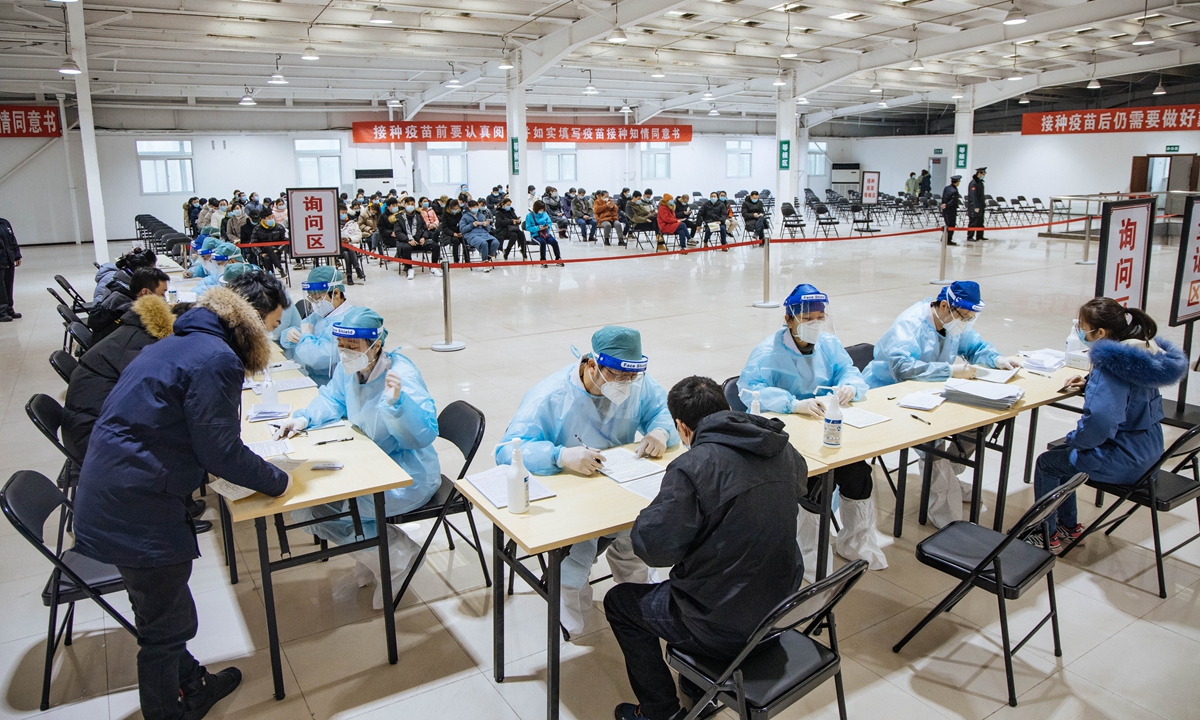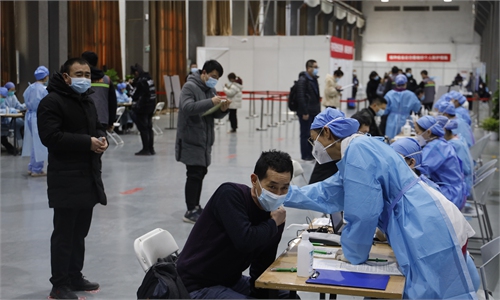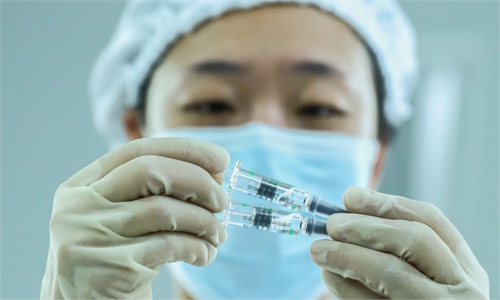Source: Grassroots mobilize to accelerate COVID-19 vaccination, to cover 65% of population by 2021
Will cover 65% of people in 2021: source

Doctors check information with people who are taking the second dose of the COVID-19 vaccine in Shijingshan district, Beijing on Monday. Photo: Li Hao/GT
Amid concerns of an immunization gap and Western media's doubts about slow inoculation, the Global Times learned that the Chinese disease control and prevention system held a nationwide online meeting on Monday to mobilize the grassroots to accelerate vaccination, with some areas vowing to vaccinate 65 percent of their local people by year-end.Representatives of grassroots government officials and officials from regional branches of the Center for Disease Control and Prevention across the country were summoned via a video meeting to carry out mass inoculations at a faster rate and with more concrete plans, the Global Times learned.
The Global Times learned from a local official in Dongtai, East China's Jiangsu Province, that according to the requirements delivered in the meeting, Dongtai had laid out a three-phase vaccination drive to cover about 40 percent of the local population, mainly adults between ages 18 and 59 by the end of June. Another 25 percent, mainly seniors aged 60 and above, would be covered by the end of this year, and the rest of the population by next year to gradually establish herd immunity.
Prior to the meeting, the Global Times learned that some provinces and municipalities, including East China's Anhui and Fujian provinces, had made similar plans and inoculation targets. But the Monday meeting indicated that China has promoted the national inoculation program to the grassroots level, which experts said is a sign that the country is indeed accelerating the speed of inoculations.
Convened by the Joint Prevention and Control Mechanism of the State Council, China's cabinet, on Monday, the meeting saw the remote participation of national, provincial and municipal officials - and even some government officials and health officials working at township-level government organs and health agencies, the Global Times learned.
To reach herd immunity, China's inoculation speed is expected to experience a bell curve, meaning the rate could be slow in the beginning and faster later on, before it drops slowly, said Tao Lina, a Shanghai-based vaccine observer.
The daily inoculation rate nationwide has the potential to peak at about 15 million doses as China is capable of creating a miracle when society pools its strength to prompt mass vaccination, Tao told the Global Times on Monday.
Feng Duojia, president of the China Vaccine Industry Association, suggested that grassroots health agencies should mobilize sufficient manpower at inoculation venues to push forward the campaign, which will undoubtedly pose a huge test for China of a 1.4 billion population.
Under this national vaccination schedule, the Dongtai official said the city would enact a local vaccination plan step by step, using the community grid management policy - a nationwide social governance system in China.
The Dongtai government will make a detailed plan. Subdistrict officials will set up specialized teams to count permanent residents in their districts and make efforts to ease public concerns and raise their willingness to get vaccinated.
The Global Times found that many Chinese local health authorities had released plans for vaccinations and added more inoculation venues to meet demand.
Feng told the Global Times that the realization of the scheduled target poses difficulties, as no country in the world has had experience in vaccinating so many people in such a short time, but it is still promising for China.
On the basis of guaranteeing export supply, China's annual production capacity can fully meet the demand of the entire country, with annual doses from different vaccine producers adding up to at least 2 billion, Feng said.
Data showed China is already accelerating its vaccination campaign against COVID-19, with 10 million doses administered in around a week. China had administered 74.96 million vaccine doses as of Saturday, while the number was 64.98 million as of March 14.
Some regions in China have started to vaccinate people aged 60 and above, based on their health conditions under the premise of a full assessment of their health and the risk of infection, and will expand coverage after more efficacy and safety data become available, experts said.



